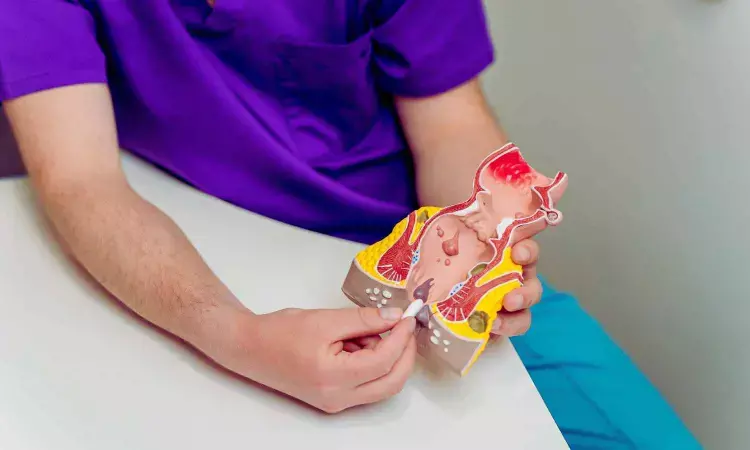- Home
- Medical news & Guidelines
- Anesthesiology
- Cardiology and CTVS
- Critical Care
- Dentistry
- Dermatology
- Diabetes and Endocrinology
- ENT
- Gastroenterology
- Medicine
- Nephrology
- Neurology
- Obstretics-Gynaecology
- Oncology
- Ophthalmology
- Orthopaedics
- Pediatrics-Neonatology
- Psychiatry
- Pulmonology
- Radiology
- Surgery
- Urology
- Laboratory Medicine
- Diet
- Nursing
- Paramedical
- Physiotherapy
- Health news
- Fact Check
- Bone Health Fact Check
- Brain Health Fact Check
- Cancer Related Fact Check
- Child Care Fact Check
- Dental and oral health fact check
- Diabetes and metabolic health fact check
- Diet and Nutrition Fact Check
- Eye and ENT Care Fact Check
- Fitness fact check
- Gut health fact check
- Heart health fact check
- Kidney health fact check
- Medical education fact check
- Men's health fact check
- Respiratory fact check
- Skin and hair care fact check
- Vaccine and Immunization fact check
- Women's health fact check
- AYUSH
- State News
- Andaman and Nicobar Islands
- Andhra Pradesh
- Arunachal Pradesh
- Assam
- Bihar
- Chandigarh
- Chattisgarh
- Dadra and Nagar Haveli
- Daman and Diu
- Delhi
- Goa
- Gujarat
- Haryana
- Himachal Pradesh
- Jammu & Kashmir
- Jharkhand
- Karnataka
- Kerala
- Ladakh
- Lakshadweep
- Madhya Pradesh
- Maharashtra
- Manipur
- Meghalaya
- Mizoram
- Nagaland
- Odisha
- Puducherry
- Punjab
- Rajasthan
- Sikkim
- Tamil Nadu
- Telangana
- Tripura
- Uttar Pradesh
- Uttrakhand
- West Bengal
- Medical Education
- Industry
Uterine Manipulators may Enhance Laparoscopic Rectal Surgery in Women: Study

A recent study published in BMC Surgery found that using uterine manipulators during laparoscopic rectal resections in women enhances operative exposure without compromising oncological safety or perioperative outcomes.
The researchers compared cases where a manipulator was employed to those without, observing that its use provided better visualization and access to the deep pelvis—crucial in women, whose pelvic anatomy and potential uterine mobility can complicate dissection.
Despite the improved surgical ergonomics, the study reported no increase in operative times, blood loss, complication rates, or positive margin occurrences. Moreover, functional outcomes post-surgery—including urinary and sexual function—remained equivalent between both groups. This suggests that using uterine manipulators is both safe and beneficial, especially in complex cases such as low rectal tumors or narrow female pelvises.
The enhanced exposure facilitated by the manipulator allows for a more precise and controlled dissection, potentially reducing technical difficulty and improving surgeon confidence. Importantly, there was no negative impact on oncological principles: specimen quality, lymph node yield, and circumferential margin status were similar with or without the device.
The authors conclude that for difficult pelvic dissections in female patients, uterine manipulator use is a valuable adjunct that doesn’t compromise safety or outcomes. However, they note that surgeon experience and familiarity with the device remain important considerations, and they encourage further randomized studies to quantify benefits on operative ergonomics, long-term outcomes, and patient quality of life.
Dr. Shravani Dali has completed her BDS from Pravara institute of medical sciences, loni. Following which she extensively worked in the healthcare sector for 2+ years. She has been actively involved in writing blogs in field of health and wellness. Currently she is pursuing her Masters of public health-health administration from Tata institute of social sciences. She can be contacted at editorial@medicaldialogues.in.
Dr Kamal Kant Kohli-MBBS, DTCD- a chest specialist with more than 30 years of practice and a flair for writing clinical articles, Dr Kamal Kant Kohli joined Medical Dialogues as a Chief Editor of Medical News. Besides writing articles, as an editor, he proofreads and verifies all the medical content published on Medical Dialogues including those coming from journals, studies,medical conferences,guidelines etc. Email: drkohli@medicaldialogues.in. Contact no. 011-43720751


